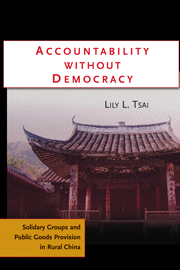Book contents
- Frontmatter
- Contents
- List of Figures
- List of Tables
- Acknowledgments
- 1 GOVERNANCE AND INFORMAL INSTITUTIONS OF ACCOUNTABILITY
- 2 DECENTRALIZATION AND LOCAL GOVERNMENTAL PERFORMANCE
- 3 LOCAL GOVERNMENTAL PERFORMANCE
- 4 INFORMAL ACCOUNTABILITY AND THE STRUCTURE OF SOLIDARY GROUPS
- 5 TEMPLES AND CHURCHES IN RURAL CHINA
- 6 LINEAGES AND LOCAL GOVERNANCE
- 7 ACCOUNTABILITY AND VILLAGE DEMOCRATIC REFORMS
- 8 THE LIMITATIONS OF FORMAL PARTY AND BUREAUCRATIC INSTITUTIONS
- 9 CONCLUSION
- References
- Appendix: Additional Notes on Survey Sampling and Data Analysis
- Index
- Cambridge Studies in Comparative Politics
8 - THE LIMITATIONS OF FORMAL PARTY AND BUREAUCRATIC INSTITUTIONS
Published online by Cambridge University Press: 05 June 2012
- Frontmatter
- Contents
- List of Figures
- List of Tables
- Acknowledgments
- 1 GOVERNANCE AND INFORMAL INSTITUTIONS OF ACCOUNTABILITY
- 2 DECENTRALIZATION AND LOCAL GOVERNMENTAL PERFORMANCE
- 3 LOCAL GOVERNMENTAL PERFORMANCE
- 4 INFORMAL ACCOUNTABILITY AND THE STRUCTURE OF SOLIDARY GROUPS
- 5 TEMPLES AND CHURCHES IN RURAL CHINA
- 6 LINEAGES AND LOCAL GOVERNANCE
- 7 ACCOUNTABILITY AND VILLAGE DEMOCRATIC REFORMS
- 8 THE LIMITATIONS OF FORMAL PARTY AND BUREAUCRATIC INSTITUTIONS
- 9 CONCLUSION
- References
- Appendix: Additional Notes on Survey Sampling and Data Analysis
- Index
- Cambridge Studies in Comparative Politics
Summary
In this chapter, we turn to formal bureaucratic institutions of accountability. As we will see, serious problems of bureaucratic monitoring and accountability plague local governance. Current bureaucratic institutions intended to enable higher-level officials to hold lower-level officials accountable have little impact on the village governmental provision of public goods and services. Evidence from my fieldwork suggests that reforming these formal institutions of accountability will be very difficult without simultaneously creating effective new systems for intergovernmental transfers and information flow within the state.
Formal Accountability at the Village Level
State elites have two key formal institutions they can use to secure compliance from village officials: village Party organizations and the bureaucratic cadre responsibility system.
Formal Party Institutions of Accountability
In terms of formal Party institutions, higher-level Party officials at the township level and above exercise authority over village officials and over officials in the village Party branch. A more detailed description of the structure of village government is presented at the beginning of Chapter 2, but as a brief review, the village government is formally composed of two organizations: the village committee and the village Party branch. Each organization typically has three to five positions, depending on the population of the village. A village head chairs the village committee. State regulations require village committee members to be elected through direct, competitive popular elections, although, as we saw in the last chapter, the implementation of these elections varies a great deal across localities. A village Party secretary chairs the village Party branch.
- Type
- Chapter
- Information
- Accountability without DemocracySolidary Groups and Public Goods Provision in Rural China, pp. 228 - 250Publisher: Cambridge University PressPrint publication year: 2007

